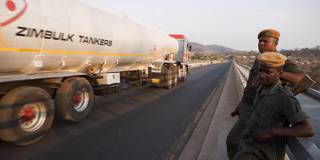While the World Trade Organization's Trade Facilitation Agreement can act as a powerful tool for progress, it cannot work in isolation. It also requires complementary reforms addressing specific country-level challenges, and a well-functioning global trading regime that accounts for developing countries' needs.
JOHANNESBURG – With the United States and China locked in a trade war, climate action lagging behind climate reality, and the World Trade Organization’s Appellate Body at risk of becoming inoperable, the theme of this week’s WTO public forum – “Trading Forward: Adapting to a Changing World” – couldn’t be more appropriate. But if the global trading system is to be adapted to twenty-first-century realities, careful attention must be paid to the needs of developing countries.

JOHANNESBURG – With the United States and China locked in a trade war, climate action lagging behind climate reality, and the World Trade Organization’s Appellate Body at risk of becoming inoperable, the theme of this week’s WTO public forum – “Trading Forward: Adapting to a Changing World” – couldn’t be more appropriate. But if the global trading system is to be adapted to twenty-first-century realities, careful attention must be paid to the needs of developing countries.